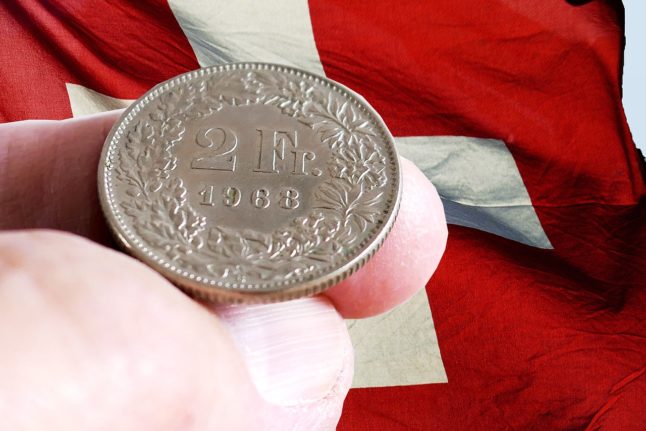Four unusual challenges that Switzerland faced in 2022

The year is almost over, so now is a good time to look back and see what unusual — for Switzerland — events that happened in 2022, and how the country handled them.
In 2020 and 2021, the end-of-year retrospections invariably focused on the pandemic.
It seemed at the time that nothing would ever preoccupy us more, or affect us more deeply, than Covid-related rules, restrictions, and measures.
During those dark days, it was difficult to see a glimmer of light at the end of the proverbial tunnel, and it often appeared that life would never go back to the pre-pandemic “normal.”
Well, it’s the end of 2022 now and Covid is no longer the hot-button topic it used to be — at least for the time being.
But the question of whether life is back to normal depends on what the definition of “normal” is. It appears that “normal” is not a static state, but it evolves based on the current events.
A new term was coined during the pandemic: “the new normal.”
Just as nobody could imagine in 2019 that our lives would be turned upside-down by a global health crisis, so we couldn’t envisage back in 2020 and 2021 that a war in Europe would break out, again disrupting — though not to the same extent as coronavirus did — our comfortable lives, reinforcing yet again the notion that the “new normal” has permanently supplanted the old one.
This is what Switzerland faced in 2021:
New phenomenon: Rising inflation
You may say that inflation is not an unusual occurrence, and you’d be right.
Except that Switzerland’s strong and resilient economy has withstood inflationary trends much better than other countries.
For instance, in 2021, Switzerland’s inflation rate stood at 0.6 percent; now it is 3 percent, which by Swiss standards is unusually high. Never mind that this figure is much lower than in the euro zone, where the current rate exceeds 10 percent — the Swiss, and especially the younger generation, are just not accustomed to inflation.

This doesn't go as far as it used it. Photo by Pixabay
READ MORE: EXPLAINED: Why Switzerland's inflation rate has stayed low compared to elsewhere
Neutrality under attack
Switzerland has always been protective of its neutrality and sovereignty.
However, Russia’s invasion of Ukraine changed — at least somewhat — this stance.
First, the Federal Council aligned itself with the EU’s sanctions against the Kremlin, even though some critics said this move was contrary to Switzerland’s long-standing policy of non-involvement in foreign affairs.
The notion of neutrality got chipped even more when a study showed that an unprecedented 52 percent of Swiss favour moving Switzerland closer to NATO in view of the war in Ukraine. And 35 percent now believe that joining a European defensive grouping would increase security more than maintaining neutrality — up 12 percent since January 2021.
READ MORE: NATO in, neutrality out: How the Ukraine invasion impacted Switzerland
Influx of refugees
While Switzerland has always admitted a limited number of asylum seekers, the unprecedented number of Ukrainians seeking refuge here — about 70,000 so far — provoked an extraordinary response.
All those fleeing the war in Ukraine have automatically been granted the so-called protection status ‘S’, which entitles the refugees to remain in Switzerland until March 2024, also giving them the right to free healthcare, social assistance, and other perks.
Fear of shortages
Switzerland is a prosperous country not accustomed to dealing with shortages of consumer services and goods (except for the shortage of toilet paper during the first weeks of Covid).
But here too, the war in Ukraine has brought a degree of uncertainty.
For months, the government has been preparing for the scarcity of gas — which is used to produce electricity — and the possibility of power outages and blackouts.
Federal, cantonal, and municipal authorities have put plans in motion to be activated in case of necessity — obviously, an unusual situation in Switzerland.
READ MORE: ‘Restrictions and bans’: What to know about Switzerland’s new energy crisis
Oddly enough, the Swiss are much better prepared for nuclear attacks with the abundance of bomb shelters everywhere, but not so much for lack of power.
However, the government has been hinting lately that this worst-case scenario will likely not happen, as the country can rely on sufficient stocks.
And that is one thing the Swiss do come to expect: the government looking out for their needs.

A good source of energy — if you have it. Photo by Lucian Alexe on Unsplash
Price hikes
Okay, okay, the Swiss are not exactly strangers to high costs of living and are used to paying more for goods than their European neighbours.
However, the announced increases in the price of electricity — again, due to Russia’s invasion of Ukraine — are enormous and exceed even the Swiss’ expectations: in some regions, the prices are set to soar by more than 40 percent over the current tariffs.
READ MORE:
- Swiss government confirms ‘sharp increase’ in electricity prices
- The everyday items getting more expensive in Switzerland
Those four challenges of 2022 represent the “new normal” for Switzerland. Only time will tell whether a new “new normal” is on the horizon in 2023.
Comments
See Also
In 2020 and 2021, the end-of-year retrospections invariably focused on the pandemic.
It seemed at the time that nothing would ever preoccupy us more, or affect us more deeply, than Covid-related rules, restrictions, and measures.
During those dark days, it was difficult to see a glimmer of light at the end of the proverbial tunnel, and it often appeared that life would never go back to the pre-pandemic “normal.”
Well, it’s the end of 2022 now and Covid is no longer the hot-button topic it used to be — at least for the time being.
But the question of whether life is back to normal depends on what the definition of “normal” is. It appears that “normal” is not a static state, but it evolves based on the current events.
A new term was coined during the pandemic: “the new normal.”
Just as nobody could imagine in 2019 that our lives would be turned upside-down by a global health crisis, so we couldn’t envisage back in 2020 and 2021 that a war in Europe would break out, again disrupting — though not to the same extent as coronavirus did — our comfortable lives, reinforcing yet again the notion that the “new normal” has permanently supplanted the old one.
This is what Switzerland faced in 2021:
New phenomenon: Rising inflation
You may say that inflation is not an unusual occurrence, and you’d be right.
Except that Switzerland’s strong and resilient economy has withstood inflationary trends much better than other countries.
For instance, in 2021, Switzerland’s inflation rate stood at 0.6 percent; now it is 3 percent, which by Swiss standards is unusually high. Never mind that this figure is much lower than in the euro zone, where the current rate exceeds 10 percent — the Swiss, and especially the younger generation, are just not accustomed to inflation.

This doesn't go as far as it used it. Photo by Pixabay
READ MORE: EXPLAINED: Why Switzerland's inflation rate has stayed low compared to elsewhere
Neutrality under attack
Switzerland has always been protective of its neutrality and sovereignty.
However, Russia’s invasion of Ukraine changed — at least somewhat — this stance.
First, the Federal Council aligned itself with the EU’s sanctions against the Kremlin, even though some critics said this move was contrary to Switzerland’s long-standing policy of non-involvement in foreign affairs.
The notion of neutrality got chipped even more when a study showed that an unprecedented 52 percent of Swiss favour moving Switzerland closer to NATO in view of the war in Ukraine. And 35 percent now believe that joining a European defensive grouping would increase security more than maintaining neutrality — up 12 percent since January 2021.
READ MORE: NATO in, neutrality out: How the Ukraine invasion impacted Switzerland
Influx of refugees
While Switzerland has always admitted a limited number of asylum seekers, the unprecedented number of Ukrainians seeking refuge here — about 70,000 so far — provoked an extraordinary response.
All those fleeing the war in Ukraine have automatically been granted the so-called protection status ‘S’, which entitles the refugees to remain in Switzerland until March 2024, also giving them the right to free healthcare, social assistance, and other perks.
Fear of shortages
Switzerland is a prosperous country not accustomed to dealing with shortages of consumer services and goods (except for the shortage of toilet paper during the first weeks of Covid).
But here too, the war in Ukraine has brought a degree of uncertainty.
For months, the government has been preparing for the scarcity of gas — which is used to produce electricity — and the possibility of power outages and blackouts.
Federal, cantonal, and municipal authorities have put plans in motion to be activated in case of necessity — obviously, an unusual situation in Switzerland.
READ MORE: ‘Restrictions and bans’: What to know about Switzerland’s new energy crisis
Oddly enough, the Swiss are much better prepared for nuclear attacks with the abundance of bomb shelters everywhere, but not so much for lack of power.
However, the government has been hinting lately that this worst-case scenario will likely not happen, as the country can rely on sufficient stocks.
And that is one thing the Swiss do come to expect: the government looking out for their needs.

A good source of energy — if you have it. Photo by Lucian Alexe on Unsplash
Price hikes
Okay, okay, the Swiss are not exactly strangers to high costs of living and are used to paying more for goods than their European neighbours.
However, the announced increases in the price of electricity — again, due to Russia’s invasion of Ukraine — are enormous and exceed even the Swiss’ expectations: in some regions, the prices are set to soar by more than 40 percent over the current tariffs.
READ MORE:
- Swiss government confirms ‘sharp increase’ in electricity prices
- The everyday items getting more expensive in Switzerland
Those four challenges of 2022 represent the “new normal” for Switzerland. Only time will tell whether a new “new normal” is on the horizon in 2023.
Join the conversation in our comments section below. Share your own views and experience and if you have a question or suggestion for our journalists then email us at [email protected].
Please keep comments civil, constructive and on topic – and make sure to read our terms of use before getting involved.
Please log in here to leave a comment.